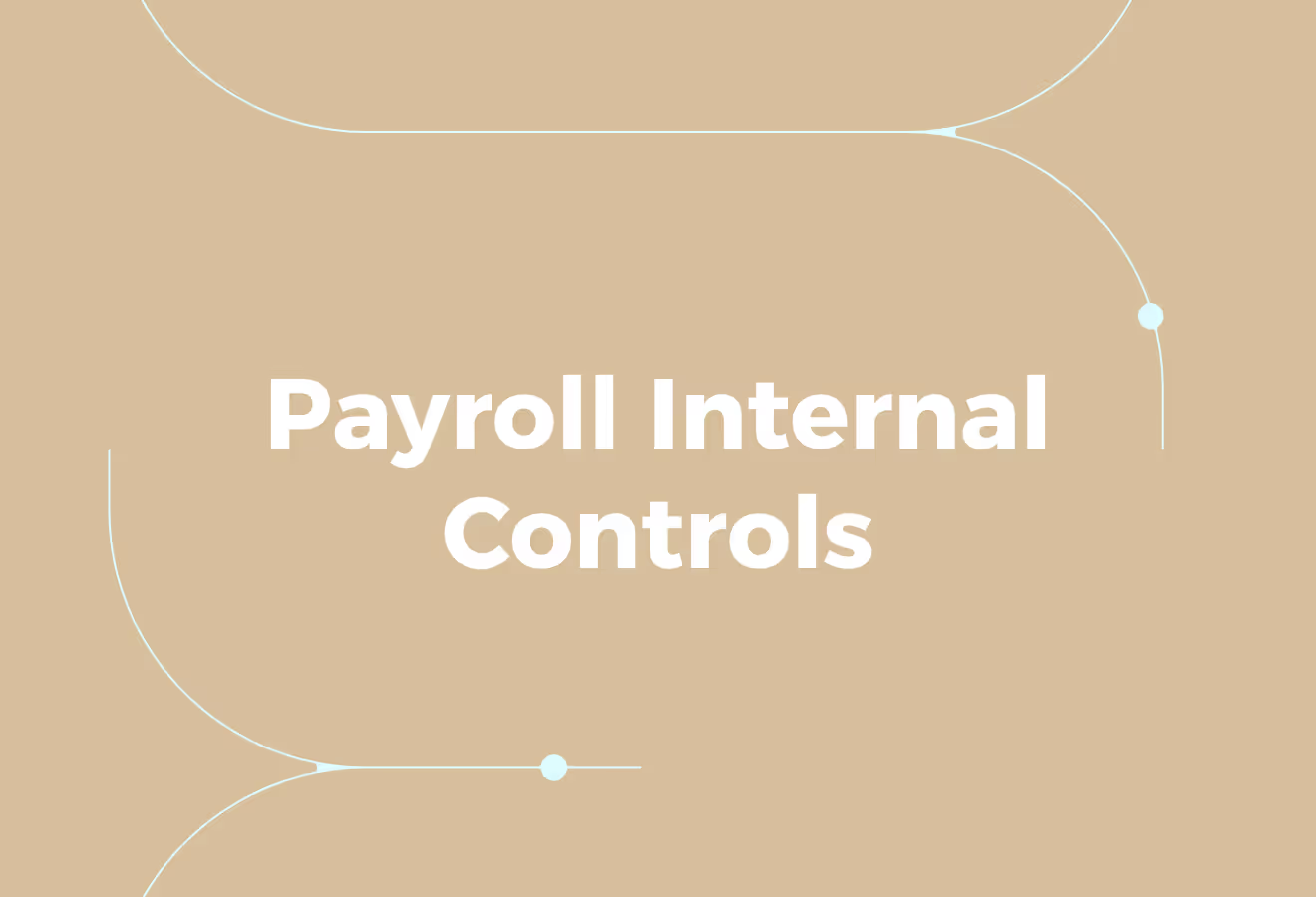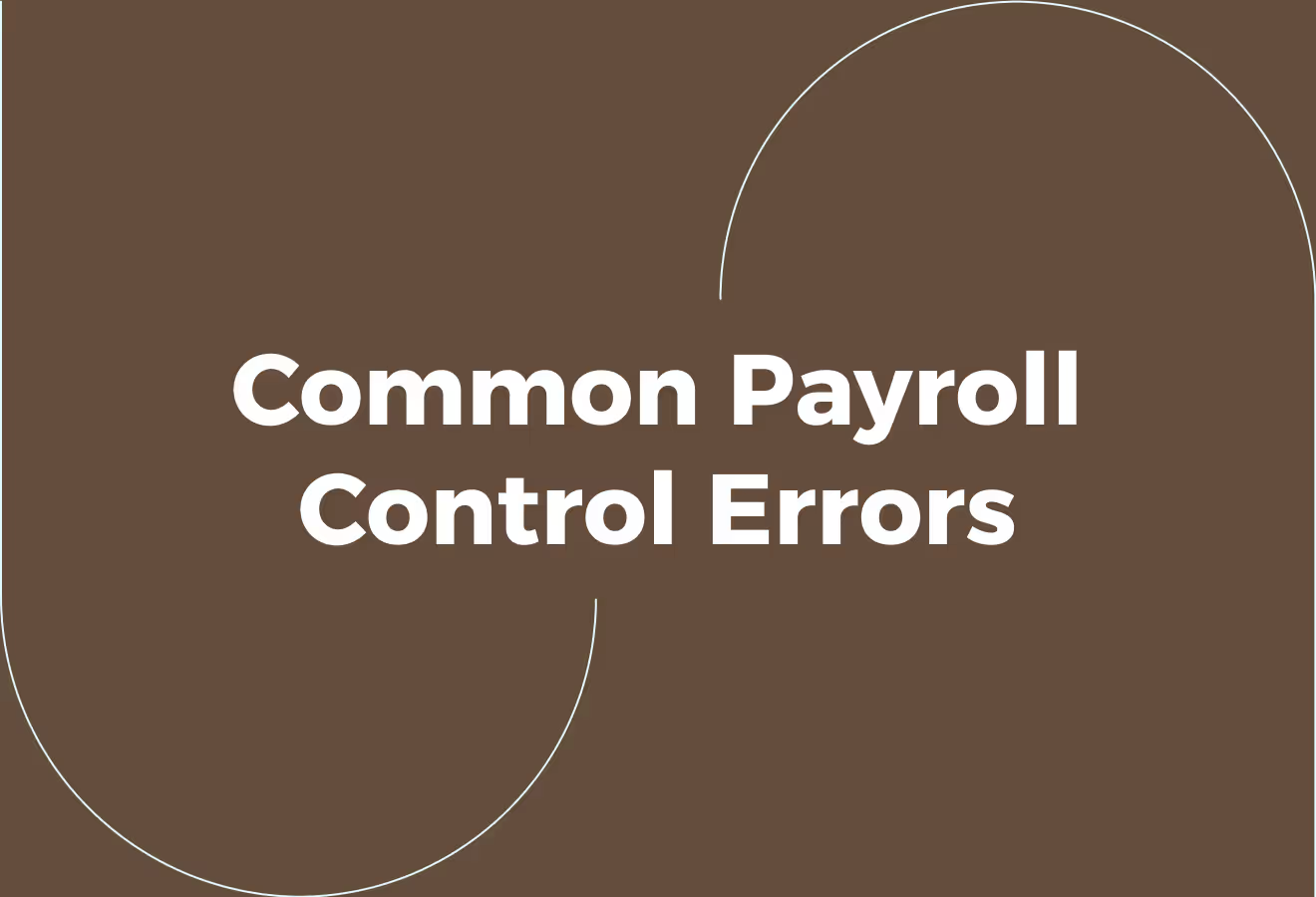5 Best Practices for Payroll Internal Controls You Should Implement
.avif)
5 Best Practices for Payroll Internal Controls You Should Implement
Managing payroll and ensuring regulatory compliance can become increasingly complex as businesses grow, particularly when expanding across borders or working with distributed teams. Different regions, industries, and employee classifications introduce a variety of compensation rules that must be followed.
This article explores effective payroll internal control practices that help mitigate risk and support compliance. To identify opportunities for improvement and streamline payroll operations, our global HR system provides valuable insights into your current processes.
What Are Payroll Internal Controls?

Internal controls are generally categorised into three types: preventive, detective, and corrective. Each plays a different but complementary role in maintaining payroll accuracy.
Preventive Controls
Preventive controls are designed to stop payroll errors or fraud before they occur. Examples include segregation of duties (so no single person controls the entire payroll process), secure system access, and clearly defined approval processes for pay changes and new hires.
Detective Controls
Detective controls are meant to identify issues after they happen. These might include payroll reconciliations, variance reports, or internal audits to spot anomalies or unauthorised changes.
Corrective Controls
Corrective controls come into play when a problem is detected. These controls ensure the issue is investigated, resolved, and that steps are taken to prevent recurrence, such as updating procedures or reinforcing training.
Related Reading
- Consequences of Payroll Errors
- Employer of Record Payrolling
- Employer of Record vs Staffing Agency
- Challenges of Managing a Global Workforce
How Strong Payroll Controls Benefit Businesses

Strong payroll controls help to minimise the risk of fraud and financial loss. When payroll responsibilities are concentrated in the hands of one or two individuals without adequate oversight, the risk of fraud increases.
Controls like segregation of duties, audit trails, and regular reconciliations help prevent schemes such as ghost employees, inflated pay, or unauthorised adjustments. This reduces financial exposure and helps protect the business from avoidable losses.
Consider using a Unified HR and Payroll Platform for MENA & Beyond to streamline and monitor payroll systems effectively.
Enhancing Employee Confidence in Timely and Accurate Pay
Strong payroll controls help enhance employee morale by ensuring accurate and timely payroll. Staff expect to be paid correctly and on time.
Consistent payroll errors, whether underpayments, overpayments, or missed deadlines, can quickly erode morale and trust. Robust internal controls ensure accuracy in pay calculations, deductions, and benefits, which in turn support staff retention and satisfaction.
Using Time Off & PTO Management with Custom Policies with Cercli helps ensure accurate leave tracking and reduces payroll disputes.
Supporting Audit Readiness and Legal Compliance
In regions like the UAE and Saudi Arabia, payroll compliance is closely tied to regulatory and tax obligations. Strong payroll controls ensure businesses are prepared for audits and inspections, with clean records, up-to-date documentation, and a clear trail of accountability. This is essential for staying aligned with labour laws, avoiding fines, and maintaining good standing with authorities.
Cercli for Regional Payroll and HR Compliance
Cercli is designed for companies in the Middle East who need a flexible, compliant, and reliable way to manage their workforce, whether teams are local, remote, or spread across multiple countries. Built for the realities of doing business in the region, Cercli helps companies in the UAE, Saudi Arabia, and across MENA simplify HR operations, stay fully compliant with local regulations, and run payroll with confidence.
From managing WPS (Wage Protection System) registrations in the UAE, processing GOSI in Saudi, handling DEWS contributions, and ensuring contracts and benefits are fully compliant, Cercli takes the complexity out of regional payroll and HR. As companies increasingly hire remote employees, contractors, and global teams, Cercli provides full support for global workforce management.
Companies can pay contractors or full-time employees in over 150 countries through multicurrency payroll, Employer of Record (EOR) services, and compliant international contracts, all through a single platform. Cercli gives HR teams a centralised system to manage every part of the employee lifecycle: onboarding, asset management, leave tracking, time off calendars, payroll processing, and offboarding. With one source of truth for all employee data, companies can eliminate manual processes, reduce payroll errors, and ensure full visibility across the entire organisation.
Related Reading
- Payroll and Compliance Challenges
- Consequences of Payroll Errors
- Payroll Outsourcing Costs
5 Best Practices for Payroll Internal Controls You Should Implement

1. Segregate Duties and Responsibilities
If the business has an in-house accounting or human resources team, it's important to divide payroll processing duties. This reduces errors and increases security by limiting access to key functions to specific individuals.
For example, one employee might process payroll while another handles reporting. If business structure allows, the HR team could keep track of employee payroll records in a personnel file rather than leaving them with accounting.
2. Run Regular Change Reports
A change report is a report that shows the differences between the latest payroll run and the previous one. This can help catch errors and correct them before issuing payments.
- You can check payroll change reports against approval processes
- These processes include timesheets, pay increases, and incentive or bonus payouts
3. Create Review and Approval Processes
Establishing formal review and approval processes helps prevent payroll accounting errors and fraudulent activity like wage theft. One of the most common payroll approval processes is for timesheets. A typical timesheet approval process will involve the employee, their supervisor, and the person responsible for running payroll. Sometimes, there may be more people involved, depending on how teams are structured.
4. Keep Payroll in a Separate Bank Account
Having a dedicated payroll bank account keeps employee wages and payroll taxes separate from the main business account. This simplifies tax filings and makes it easier to track payroll funds and catch potential banking errors.
A separate payroll bank account also offers protection against fraud. Should someone gain access to the payroll account, the rest of the business finances remain protected.
5. Implement Security Measures
Alongside approval processes, payroll processing functions must be secured. This includes storing payroll records in password-protected files and locking paper records in a secure cabinet.
Most payroll service providers implement additional access controls. They typically require businesses to designate a staff member as the authorised point of contact, which limits the number of individuals with access to sensitive payroll records and helps reduce risk.
Common Payroll Control Errors and How to Avoid Them

Don’t Miss Tax Deadlines
In a multinational company, the payroll department is responsible for filing tax returns in jurisdictions where the company operates. Each jurisdiction has its deadlines and requirements, making global payroll compliance a complex task.
This complexity can lead to missed deadlines due to administrative oversights, insufficient tracking systems, and lack of team coordination. Missing tax deadlines has serious consequences, such as substantial penalties, fines, reputational damage, and other legal risks.
Don’t Misclassify Workers
Correctly classifying workers as employees or contractors is crucial for tax obligations, benefits, and compliance with labour laws. Misclassifying employees as contractors can lead to serious consequences.
Key risks include:
- Ineligibility for employee benefits - Reduced job security - Working hours and wages disputes - Loss of overtime pay
Jurisdictional Variance and Legal Consequences
Each country or jurisdiction has distinct criteria for classifying workers, and misclassification can lead to severe legal risks and penalties.
For companies operating in multiple countries, keeping track of complex and varying criteria can be challenging, increasing the risk of misclassification.
Don’t Select The Wrong Payroll Partner
Partnering with third-party payroll providers has become increasingly common. According to a Deloitte study, 73% of organisations outsource some part of their payroll process.
A payroll partner is responsible for processing payroll data, providing timely and accurate payments, calculating and withholding taxes, and ensuring compliance with local labour laws.
However, not all payroll partners have the necessary expertise, technological capabilities, and reliability to handle a company’s payroll needs effectively. Selecting the wrong payroll partner can cause critical errors and delays in payroll processing, leading to employee dissatisfaction, financial losses, and potential legal issues.
Don’t Handle Various Payroll Providers Without Automated Data Consolidation
When companies expand globally, they often engage different payroll providers in various countries or regions where they operate. However, working with multiple vendors becomes more challenging as the volume of data flowing between external service partners and the central Human Capital Management (HCM) system increases. Without proper integration and consolidation, payroll data becomes scattered. This leads to inefficient workflows, poor data transparency, and difficulty in generating comprehensive reports.
Don’t Skip Business Registration
When hiring international employees, companies must establish a legal entity or register as a foreign employer before initiating payroll activities. Proper registration is essential as it establishes the organisation’s legal status and obligations within the host country, enabling the employer to hire employees and conduct business activities legally.
It also ensures employees receive their rights and entitlements, such as benefits and leaves, as stipulated by local laws. Not being registered properly to hire abroad can result in legal and financial liabilities and operational disruptions.
Don’t Neglect Data Protection
Payroll data contains highly confidential and sensitive employee information, such as social security numbers and tax details, making it a prime target for cyber-attacks. Failing to protect this data can lead to data breaches, privacy violations, legal penalties, and reputational damage.
Each jurisdiction enforces stringent data protection laws, as it involves sensitive personal information. For example, Europe enforces the General Data Protection Regulation (GDPR), which governs how organisations collect, use, store, and process personal data of individuals within the EU and EEA.
Don’t Forget About Payment Delays
Failing to account for exchange rate fluctuations can result in significant financial discrepancies. Exchange rates can change rapidly, and without accurate, up-to-date information, payroll teams may face challenges in ensuring the correct amounts are paid to international employees.
This can lead to underpayment or overpayment, causing financial inconsistencies. Inaccurate currency conversions due to outdated exchange rates can worsen these issues, leading to further losses.
9 Best Ways to Pay International Contractors offers insight into handling multi-currency payments. Companies hiring in countries like Lebanon without the headaches can benefit from prebuilt currency support.
Don’t Fail to Account for Exchange Rate Fluctuations
Failing to account for exchange rate fluctuations can result in significant financial discrepancies. Exchange rates can change rapidly, and without accurate, up-to-date information, payroll teams may face challenges in ensuring the correct amounts are paid to international employees. This can lead to underpayment or overpayment, causing financial inconsistencies.
Inaccurate currency conversions due to outdated exchange rates can exacerbate these issues, leading to further losses.
Related Reading
- Employer of Record vs PEO
- AI Tools for HR
- Remote Global Payroll
- Global EOR
Book a Demo to Speak with Our Team about Our Global HR System
Expanding your workforce across borders can help your company grow and become more resilient. However, the complexities of managing a globally dispersed team can be daunting. Cercli simplifies this process for companies in the Middle East with its employer of record services. Cercli helps businesses manage their entire workforce, whether local or spread across 150+ countries, all in one platform.
Companies can run fully compliant payroll across the UAE, Saudi Arabia, and the wider MENA region, manage leave, onboard employees, track assets, and handle global contractor payments in multiple currencies with ease. Whether you’re managing 25 employees or scaling to 500+ across multiple markets, Cercli combines deep local expertise with global capabilities, giving your HR team one simple, compliant system to run operations and pay your workforce anywhere.










